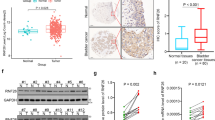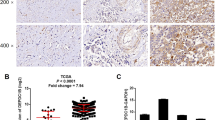Abstract
Pyrroline-5-carboxylate reductase 1 (PYCR1) plays a significant role in the malignant progression of various cancers. However, the role of PYCR1 in bladder cancer has not been well studied. This study was performed to evaluate the potential relevance of PYCR1 in bladder cancer. Our data revealed that PYCR1 expression was increased in bladder cancer tissues, and increased expression of PYCR1 was predictive of decreased survival rates. In bladder cancer cell lines, knockdown of PYCR1 caused significantly retarded cell growth and invasion, while PYCR1 overexpression accelerated cellular proliferation and invasion. Moreover, PYCR1 knockdown decreased levels of phosphorylated Akt, and enhanced activation of Wnt/β-catenin signaling. Akt inhibition markedly abrogated of PYCR1 overexpression-mediated activation of Wnt/β-catenin signaling. In addition, overexpression of β-catenin partially reversed PYCR1 knockdown-mediated tumor suppression. Notably, PYCR1 knockdown significantly impeded tumor formation and growth in bladder cancer cells in vivo. In conclusion, these data demonstrate that PYCR1 is highly expressed in bladder cancer and knockdown of PYCR1 exerts a remarkable inhibitory effect on tumor formation via downregulation of Akt/Wnt/β-catenin signaling. Our study suggests a potential role for PYCR1 in promoting bladder cancer progression and indicates that PYCR1 may be utilized as an attractive and promising anticancer target for treatment of bladder cancer.







Similar content being viewed by others
Data availability
The datasets generated and/or analyzed during the current study are available from the corresponding author on reasonable request.
References
Adams E, Frank L (1980) Metabolism of proline and the hydroxyprolines. Annu Rev Biochem 49:1005–1061
Berdik C (2017) Unlocking bladder cancer. Nature 551:S34–S35
Bray F, Ferlay J, Soerjomataram I, Siegel RL, Torre LA, Jemal A (2018) Global cancer statistics 2018: GLOBOCAN estimates of incidence and mortality worldwide for 36 cancers in 185 countries. CA Cancer J Clin 68:394–424
Cai F, Miao Y, Liu C, Wu T, Shen S, Su X, Shi Y (2018) Pyrroline-5-carboxylate reductase 1 promotes proliferation and inhibits apoptosis in non-small cell lung cancer. Oncol Lett 15:731–740
Cross DA, Alessi DR, Cohen P, Andjelkovich M, Hemmings BA (1995) Inhibition of glycogen synthase kinase-3 by insulin mediated by protein kinase B. Nature 378:785–789
De Ingeniis J, Ratnikov B, Richardson AD, Scott DA, Aza-Blanc P, De SK, Kazanov M, Pellecchia M, Ronai Z, Osterman AL, Smith JW (2012) Functional specialization in proline biosynthesis of melanoma. PLoS One 7:e45190
Ding J, Kuo ML, Su L, Xue L, Luh F, Zhang H, Wang J, Lin TG, Zhang K, Chu P, Zheng S, Liu X, Yen Y (2017) Human mitochondrial pyrroline-5-carboxylate reductase 1 promotes invasiveness and impacts survival in breast cancers. Carcinogenesis 38:519–531
Du S, Zhang P, Ren W, Yang F, Du C (2020) Circ-ZNF609 accelerates the radioresistance of prostate cancer cells by promoting the glycolytic metabolism through miR-501-3p/HK2 axis. Cancer Manag Res 12:7487–7499
Duchartre Y, Kim YM, Kahn M (2016) The Wnt signaling pathway in cancer. Crit Rev Oncol Hematol 99:141–149
Gao Y, Luo L, Xie Y, Zhao Y, Yao J, Liu X (2020) PYCR1 knockdown inhibits the proliferation, migration, and invasion by affecting JAK/STAT signaling pathway in lung adenocarcinoma. Mol Carcinog 59:503–511
Garg M, Maurya N (2019) WNT/beta-catenin signaling in urothelial carcinoma of bladder. World J Nephrol 8:83–94
Guo L, Cui C, Zhang K, Wang J, Wang Y, Lu Y, Chen K, Yuan J, Xiao G, Tang B, Sun Y, Wu C (2019) Kindlin-2 links mechano-environment to proline synthesis and tumor growth. Nat Commun 10:845
Kamat AM, Hahn NM, Efstathiou JA, Lerner SP, Malmstrom PU, Choi W, Guo CC, Lotan Y, Kassouf W (2016) Bladder cancer. Lancet 388:2796–2810
McConkey DJ, Lee S, Choi W, Tran M, Majewski T, Lee S, Siefker-Radtke A, Dinney C, Czerniak B (2010) Molecular genetics of bladder cancer: emerging mechanisms of tumor initiation and progression. Urol Oncol 28:429–440
Mosimann C, Hausmann G, Basler K (2009) Beta-catenin hits chromatin: regulation of Wnt target gene activation. Nat Rev Mol Cell Biol 10:276–286
Nakamura T, Hamada F, Ishidate T, Anai K, Kawahara K, Toyoshima K, Akiyama T (1998) Axin, an inhibitor of the Wnt signalling pathway, interacts with beta-catenin, GSK-3beta and APC and reduces the beta-catenin level. Genes Cells 3:395–403
Niehrs C (2012) The complex world of WNT receptor signalling. Nat Rev Mol Cell Biol 13:767–779
Pang C, Guan Y, Li H, Chen W, Zhu G (2016) Urologic cancer in China. Jpn J Clin Oncol 46:497–501
Reversade B, Escande-Beillard N, Dimopoulou A, Fischer B, Chng SC, Li Y, Shboul M, Tham PY, Kayserili H, Al-Gazali L, Shahwan M, Brancati F, Lee H, O'Connor BD, Schmidt-von Kegler M, Merriman B, Nelson SF, Masri A, Alkazaleh F, Guerra D, Ferrari P, Nanda A, Rajab A, Markie D, Gray M, Nelson J, Grix A, Sommer A, Savarirayan R, Janecke AR, Steichen E, Sillence D, Hausser I, Budde B, Nurnberg G, Nurnberg P, Seemann P, Kunkel D, Zambruno G, Dallapiccola B, Schuelke M, Robertson S, Hamamy H, Wollnik B, Van Maldergem L, Mundlos S, Kornak U (2009) Mutations in PYCR1 cause cutis laxa with progeroid features. Nat Genet 41:1016–1021
Sathe A, Nawroth R (2018) Targeting the PI3K/AKT/mTOR pathway in bladder cancer. Methods Mol Biol 1655:335–350
Wang D, Wang L, Zhang Y, Yan Z, Liu L, Chen G (2019) PYCR1 promotes the progression of non-small-cell lung cancer under the negative regulation of miR-488. Biomed Pharmacother 111:588–595
Wang QL, Liu L (2019) PYCR1 is associated with papillary renal cell carcinoma progression. Open Med (Wars) 14:586–592
Weijin F, Zhibin X, Shengfeng Z, Xiaoli Y, Qijian D, Jiayi L, Qiumei L, Yilong C, Hua M, Deyun L, Jiwen C (2019) The clinical significance of PYCR1 expression in renal cell carcinoma. Medicine 98:e16384
Witjes JA, Comperat E, Cowan NC, De Santis M, Gakis G, Lebret T, Ribal MJ, Van der Heijden AG, Sherif A (2014) EAU guidelines on muscle-invasive and metastatic bladder cancer: summary of the 2013 guidelines. Eur Urol 65:778–792
Yan K, Xu X, Wu T, Li J, Cao G, Li Y, Ji Z (2019) Knockdown of PYCR1 inhibits proliferation, drug resistance and EMT in colorectal cancer cells by regulating STAT3-mediated p38 MAPK and NF-kappaB signalling pathway. Biochem Biophys Res Commun 520:486–491
Yasuda T, Kaji Y, Agatsuma T, Niki T, Arisawa M, Shuto S, Ariga H, Iguchi-Ariga SM (2013) DJ-1 cooperates with PYCR1 in cell protection against oxidative stress. Biochem Biophys Res Commun 436:289–294
Ye Y, Wu Y, Wang J (2018) Pyrroline-5-carboxylate reductase 1 promotes cell proliferation via inhibiting apoptosis in human malignant melanoma. Cancer Manag Res 10:6399–6407
Zeng T, Zhu L, Liao M, Zhuo W, Yang S, Wu W, Wang D (2017) Knockdown of PYCR1 inhibits cell proliferation and colony formation via cell cycle arrest and apoptosis in prostate cancer. Med Oncol 34:27
Zhuang J, Song Y, Ye Y, He S, Ma X, Zhang M, Ni J, Wang J, Xia W (2019) PYCR1 interference inhibits cell growth and survival via c-Jun N-terminal kinase/insulin receptor substrate 1 (JNK/IRS1) pathway in hepatocellular cancer. J Transl Med 17:343
Code availability
Not applicable.
Author information
Authors and Affiliations
Contributions
Shuangkuan Du designed the study, performed the experiments and drafted the manuscript. Yongjie Sui designed the study and revised the manuscript. Wei Ren performed the experiments. Jiancheng Zhou interpreted the data. Chun Du interpreted the data. The author(s) read and approved the final manuscript.
Corresponding author
Ethics declarations
Ethics approval
Research was carried out with the approval of Ethics Committee of Shaanxi Provincial People’s Hospital and was conducted in accordance with the principles of the Helsinki Declaration. Animal experiments were performed with the approval of the Ethics Committee of Shaanxi Provincial People’s Hospital.
Consent to participate
All patients provided written informed consent with regard to tissue donation for the purpose of this study.
Consent for publication
All authors have approved for the publication of this manuscript.
Conflict of interest
The authors declare no conflicts of interest.
Additional information
Publisher’s note
Springer Nature remains neutral with regard to jurisdictional claims in published maps and institutional affiliations.
Supplementary Information
ESM 1
(DOCX 497 kb)
Rights and permissions
About this article
Cite this article
Du, S., Sui, Y., Ren, W. et al. PYCR1 promotes bladder cancer by affecting the Akt/Wnt/β-catenin signaling. J Bioenerg Biomembr 53, 247–258 (2021). https://doi.org/10.1007/s10863-021-09887-3
Received:
Accepted:
Published:
Issue Date:
DOI: https://doi.org/10.1007/s10863-021-09887-3




